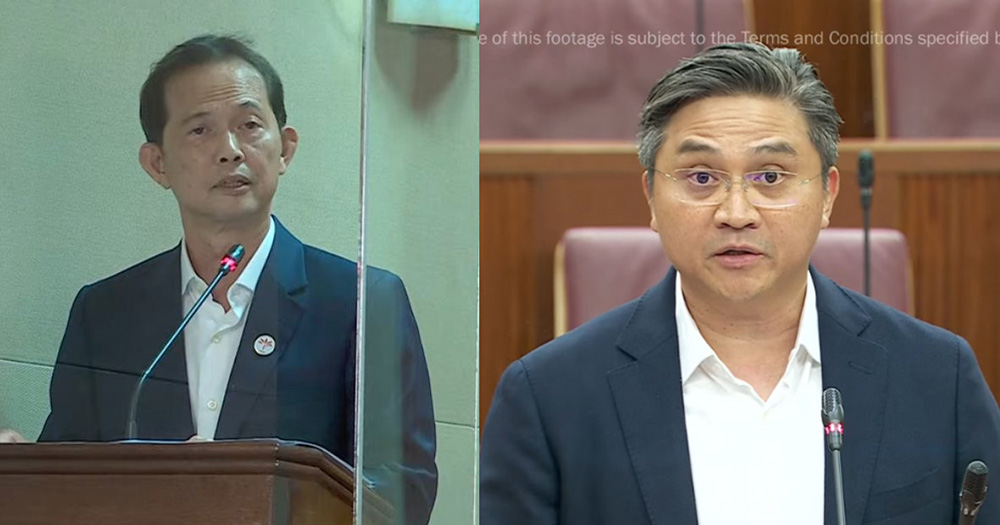Follow us on Telegram for the latest updates: https://t.me/mothershipsg
If the government imposes a levy of S$1,200 on Employment Pass (EP) holders, it will raise almost S$3 billion in revenue, thereby rendering the GST hike unnecessary, Leong Mun Wai of the Progress Singapore Party (PSP) said.
Speaking in Parliament on Feb. 28 at the debate on Budget 2022, the Non-Constituency Member of Parliament (NCMP) said a levy is a "more effective" way to manage the quality of EP holders as it ensures fair competition between the EPs and Singaporeans.
He added:
"Not enough has been done on foreign manpower policy too. The increase in the minimum qualifying salary (MQS) for Employment Pass holders is too little to be effective. I am also surprised that S-pass holders are needed in the finance industry where many Singaporeans are hoping to work."
EP levy would reduce quality of talent: Tan See Leng
However, this is not the first time that Leong has floated the proposal of a S$1,200 levy on EP holders in Parliament.
Previously in Sep. 2021, Manpower Minister Tan See Leng addressed Leong's proposal by stating while such an action may sound easy, the focus is on regulating quality. As such, a levy would have the opposite effect.
Explaining that employers had finite budgets for manpower, he gave the following scenario:
"Suppose an employer has set aside $10,000 a month for a new PME hire. A levy of S$1,200 effectively reduces his budget to S$8,800. This immediately narrows the pool of EP candidates, from those willing to consider a salary of S$10,000 and below, to those willing to consider a salary of S$8,800 and below."
The minister then asked, "How would this benefit the employer or his Singaporean employees, if the intention is to seek the best talents available?"
In addition, a levy would also send contradictory signals if Singapore says that it welcomes "high-calibre global professionals" on one hand but imposes a levy on the other, Tan said.
Hence, the government focuses on regulating quality through the EP qualifying salary criteria, which sets a high bar for EP holders to attain to be able to work in Singapore and raises quality over time.
Leong claims middle-class Singaporeans will have to bear additional burden of S$1.2 billion
Leong also claimed that "middle-class" Singaporeans will have to bear an additional GST burden of S$1.2 billion per year while many Singaporeans living in private properties who are asset-rich but cash-strapped, will bear a significant part of the S$380 million property tax increase per year.
When queried by PAP MP Saktiandi Supaat in a follow-up question as to where he got the figure of S$1.2 billion Leong said:
"I got the data by calculating from the ratio given by the Minister (for) Finance in terms of the share of the GST paid by the top 20 per cent and the bottom 80 per cent. It was in the ratio of 60 to 40 percent.
Okay, so 40 per cent to the bottom 80 per cent and 60 per cent to the top 20 per cent. So, if the total amount of GST revenue (is) to be raised from a 2 per cent increase in GST, that will be about S$3 billion. So, 40 per cent of S$3 billion, that's how I got my S$1.2 billion."
Saktiandi then asked if Leong took into consideration the amount that middle-income Singaporeans will receive under the Assurance Package, which comes up to S$6.6 billion in total, and the permanent GST voucher scheme.
Leong said his calculations do not take that into account. He added:
"I presume that the GST vouchers and all the compensation payment will only apply to the lower-income Singaporeans. There are some applying to the middle income, but the permanent GST Voucher, all that, belongs to only the lower income.
So at the end of the day, when the government argues that this is not regressive, it is not true, because apart from the top 20 per cent, who are the people who will bear the remaining 40 per cent of the GST increase? Must be the middle class Singaporeans. I hope that answers your question. Thank you."
Related story:
Follow and listen to our podcast here
Top screenshots from MCI YouTube
If you like what you read, follow us on Facebook, Instagram, Twitter and Telegram to get the latest updates.
